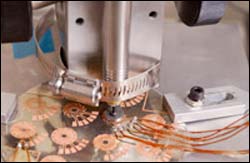This topic covers issues related to energy generation, conversion, transportation and consumption and how the industry is addressing the challenge of energy efficiency in general.
innovations-report provides in-depth and informative reports and articles on subjects ranging from wind energy, fuel cell technology, solar energy, geothermal energy, petroleum, gas, nuclear engineering, alternative energy and energy efficiency to fusion, hydrogen and superconductor technologies.

Time is money, especially to the semiconductor industry. Electronics manufacturers use extremely sophisticated equipment to churn out the latest microchips, but they have a timing problem. It’s very difficult to get all the fabrication tools in a manufacturing line to agree on the time. Components within a single tool can disagree on the time by as much as two minutes, because of a lack of synchronization.
According to a new report by the National Institute of Standards and Tech

Researchers at the U.S. Department of Energy’s Idaho National Engineering and Environmental Laboratory and Ceramatec, Inc. of Salt Lake City are reporting a significant development in their efforts to help the nation advance toward a clean hydrogen economy.
Laboratory teams have announced they’ve achieved a major advancement in the production of hydrogen from water using high-temperature electrolysis. Instead of conventional electrolysis, which uses only electric current to separ

MIT and Columbia University students and researchers have begun operation of a novel experiment that confines high-temperature ionized gas, called plasma, using the strong magnetic fields from a half-ton superconducting ring inside a huge vessel reminiscent of a spaceship. The experiment, the first of its kind, will test whether nature’s way of confining high-temperature gas might lead to a new source of energy for the world.
First results from the Levitated Dipole Experiment

Researchers at Purdue University have created a “unified model” for predicting the reliability of new designs for silicon transistors – a potential tool that industry could use to save tens of millions of dollars annually in testing costs.
The model is the first method that can be used to simultaneously evaluate the reliability of two types of transistors essential for so-called CMOS computer chips, the most common type of integrated circuits in use today. The two types of transi

New microengines would be smaller, last 10 times longer than batteries
It may be tiny, but a new microgenerator developed at Georgia Tech can now produce enough power to run a small electronic device, like a cell phone, and may soon be able to power a laptop. The microgenerator is about 10 millimeters wide, or about the size of a dime. When coupled with a similarly sized gas-fueled microturbine (or jet) engine, the system, called a microengine, has the potential to deliver more

A British engineer believes he can secure cost effective tidal power by innovatively placing existing turbine designs inside large bore underwater pipes. Don Cutler’s view is that it’s best to use everything that’s standard. “You don’t re-invent the wheel you improve it.”
“Sea water is a most aggressive environment, but using modern materials like carbon fibres, and Teflon, are about the only clever things about my design,” he says. Cutler’s design is specifically aimed at ta